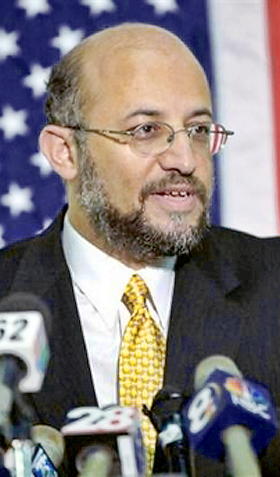Entered into the database on Wednesday, December 07th, 2005 @ 20:52:54 MST
In a case closely watched as a key test of the Patriot Act, a former
university professor accused of helping lead a Palestinian terrorist organization
was acquitted Tuesday on nearly half of the charges against him, and the jury
deadlocked on the rest. Sami Al-Arian, who taught computer engineering at the University of South Florida
in Tampa, wept and embraced his lawyer after the federal jury found him not
guilty on eight of 17 counts — including conspiring to murder and maim
people outside the United States. The panel deadlocked on charges that he had,
among other things, engaged in money laundering and attempted to illegally obtain
U.S. citizenship. The government also failed to secure convictions against three codefendants
with alleged ties to the Palestinian Islamic Jihad, which has claimed responsibility
for suicide bombings and other attacks that have killed more than 100 people
in Israel and the occupied territories. Sameeh Hammoudeh and Ghassan Zayed Ballut were acquitted on all charges. Hatem
Naji Fariz was found not guilty on 24 counts, and jurors failed to reach a verdict
on eight others. Federal prosecutors had no comment Tuesday on what was, for them, a dismaying
outcome after 13 days of jury deliberations and five months of detailed testimony.
U.S. Atty. Paul Perez said he and his staff would review the case before deciding
whether to retry Al-Arian, 47. Until then, he will remain in jail. "While we respect the jury's verdict, we stand by the evidence we presented
in court against Sami Al-Arian and his codefendants," Tasia Scolinos, the
Justice Department's director of public affairs, said in a statement released
in Washington. "We remain focused on the important task at hand, which is to protect
our country through our ongoing vigorous prosecution of terrorism cases." Outside the Tampa courthouse, Al-Arian's wife, Nahla, said she was "ecstatic." "My husband is an outspoken Palestinian activist who loved this country,
believed in the system, and the system did not fail him," she said. Defense lawyer Linda Moreno called Tuesday's events a rebuke of the government's
allegations against Al-Arian and said she would ask U.S. District Judge James
S. Moody Jr., who presided over the trial, to release him. In 2003, then-Atty. Gen. John Ashcroft had called the indictment of Al-Arian
one of the first tangible results of the Patriot Act, which gave the government
expanded powers to investigate the activities of suspected terrorists and their
sympathizers. The jury's decision comes as portions of the law are about to expire and the
Bush administration is negotiating with Congress to secure their extension. The Patriot Act, the government says, has enabled intelligence agents and prosecutors
to share information in areas where such exchanges were barred. It also has
eased restrictions on obtaining wiretaps and other surveillance in investigations. The provisions at issue in the Al-Arian case were considered noncontroversial,
although the setback for the government is likely to result in further scrutiny
of Justice Department claims that the tools are vital to defend the country. Even before the law was enacted, "if they had found that Al-Arian was
doing anything criminal, the evidence could have been disclosed to prosecutors
and introduced against him in court," said James Dempsey, executive director
of the Center for Democracy and Technology, a Washington advocacy group. Added David Cole, a professor at Georgetown University Law Center in Washington:
"They say the Patriot Act allows them to connect the dots. But they failed
to make the most important connection, which was to tie Mr. Al-Arian to some
violent or criminal act. "It should make the government rethink its reliance on these very broad
theories of guilt by association," he said. In closing arguments, federal prosecutor Cherie Krigsman said that although
Al-Arian and his codefendants had not killed anyone, they had conspired to help
Palestinian terrorists by raising money and representing the Palestinian Islamic
Jihad in the U.S. She called Al-Arian one of the group's "crime bosses." Al-Arian's lead lawyer, William Moffitt, did not call a single witness during
the trial, saying that his client — who was born in Kuwait to Palestinian
refugee parents and has lived in the U.S. since 1975 — had done nothing
beyond exercising his right to espouse the Palestinian cause. Although Al-Arian was affiliated with the Palestinian Islamic Jihad, which
the State Department has designated a terrorist organization, Moffitt said his
client had never been involved in violence. Money collected in the U.S. was
used for charitable purposes, not funding terrorism, the defense said. In one videotape shown to the jury, Al-Arian was seen publicly calling for
"death to Israel." Moffitt acknowledged that Al-Arian had lied about
his ties to the jihad group but said he did so in order to pursue his scholarly
activities. Al-Arian was fired by the University of South Florida after he was
indicted. The Justice Department has had trouble winning convictions in terrorism cases.
A guilty verdict against members of an alleged "sleeper cell" in Detroit
was thrown out last year by a federal judge amid allegations that prosecutors
had withheld exculpatory evidence from the defense. The Al-Arian case, legal experts said, shows that juries are sensitive to free-speech
concerns even when the stakes are high, as in terrorism cases. The Justice Department suffered a similar setback last year in federal court
in Idaho, when a jury acquitted a Saudi computer student on charges that he
had spread terrorism on the Internet. The defendant in that case argued that
he was being prosecuted for views protected by the 1st Amendment. Al-Arian's lawyers also asserted that his views, however unpopular, were constitutionally
protected. "It sounds to me they were treading on the same ground — that people's
beliefs or thoughts or wishes were criminal," said David Nevin, a Boise
lawyer who defended the student in Idaho last year. "I think juries are
pretty reluctant to go there."
